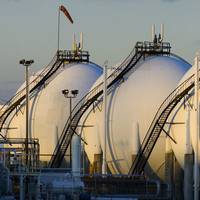Fire burns out of control at Philadelphia refinery
A fire was burning out of control at an oil refinery in Pennsylvania on Friday morning, a Philadelphia fire department official said, as local media reported a series of explosions on site.NBC Philadelphia said the "massive" blaze at the 335,000 barrels per day Philadelphia Energy Solutions refinery was visible from miles away and triggered explosions that were felt as far away as South Jersey.The crude section at the Girard Point portion of the refinery was shut down due to the fire, intelligence provider Genscape said.There were no immediate reports of casualties at the complex, which the NBC affiliate said employs around 1,000 people.A company spokeswoman was not immediately available for comment.Three fire stations and a hazardous materials response crew were mobilised, the fire depart
PA Pipeline Spat Could Upend International Oil Flows
Refiners from the Midwest United States are fighting for access to a vital Pennsylvania pipeline – a move that could cripple their East Coast competitors and redraw the map for international flows of crude and fuel into coveted coastal markets. The regulatory dispute centers on a proposal by pipeline operator Buckeye Partners’ to that state's Public Utilities Commission. The plan would reverse the flow of fuels on a section of Buckeye’s 350-mile Laurel Pipeline, which currently flows from the East Coast to Pittsburgh. Because pipelines only flow in one direction, the change would effectively block five East Coast refineries from serving Pittsburgh – with Midwest refiners picking up their market share.
US Refiners' Group Wants Wide Debate on Oil Exports
The U.S. oil refining industry's association is not opposed to lifting the country's 40-year-old ban on crude exports as long as the move is part of a bigger effort to lower barriers to trade, the group's new head said on Tuesday. "We're not opposed to lifting the export ban, but we would like to think there could be a broader discussion," about all trade barriers in petroleum markets, Chet Thompson, president of the American Fuel & Petrochemical Manufacturers (AFPM), told reporters. Other trade barriers include the Jones Act, which requires ships servicing coastal businesses to be built in the United States and mostly staffed by U.S.
Oil Tankers Idle for Months off US, Puzzling Some
Late last November, the tanker Olympic Flag carrying 650,000 barrels of Angolan crude dropped anchor about 7 miles off the coast in Delaware Bay, a seemingly routine shipment destined for a nearby Philadelphia refinery. What happened next was anything but routine. Instead of discharging its cargo within days and heading off for the next port, the ship idled offshore for nearly 11 weeks, discharging the oil at an unaccountably slow rate, according to shipping sources as well as vessel tracking data on ThomsonReuters Eikon. That vessel finally set sail two weeks ago - but by then it had already been joined by five more idling tankers, an unusual and costly congregation that has puzzled experts and traders.
Tankers Idle at Big Stone, Puzzling Some
Late last November, the tanker Olympic Flag carrying 650,000 barrels of Angolan crude dropped anchor about 7 miles off the coast in Delaware Bay, a seemingly routine shipment destined for a nearby Philadelphia refinery. What happened next was anything but routine. Instead of discharging its cargo within days and heading off for the next port, the ship idled offshore for nearly 11 weeks, discharging the oil at an unaccountably slow rate, according to shipping sources as well as vessel tracking data on ThomsonReuters Eikon. That vessel finally set sail two weeks ago - but by then it had already been joined by five more idling tankers, an unusual and costly congregation that has puzzled experts and traders.
Cold Snap has European Traders Eyeing Diesel Exports to US
Diesel and heating oil exports will increase to the United States from Europe, traders said, reversing the usual flow, as refineries on the U.S. East Coast struggle against extreme cold that has partly frozen the Delaware River. On Friday New York heating oil's premium to European gasoil spiked to its highest level since the January 2014 'polar vortex', as temperatures dropped as low as -18 degrees centigrade (-0.4 Fahrenheit), knocking a number of key refineries offline. Traditionally the United States has sent diesel to Europe, where the fuel is much more commonly used in cars, while European refiners have sent excess gasoline cargoes across the Atlantic. A so-called 'reverse-arbitrage' trade has been underway since the start of February as a cold snap on the U.S.
Local Glitches Drag U.S. Refinery Capacity Down
U.S. oil refiners work to recover from weekend glitches, fires. Three of the largest U.S. oil refineries will be working to restore operations on Tuesday after a series of weekend glitches temporarily knocked out some 1 million barrels per day (bpd) of processing capacity, the worse spate of outages in years. A fourth plant, Husky Energy Inc's 155,000-bpd Lima, Ohio, refinery, is not expected back online until the end of the week after a blast at its 25,000-bpd isocracker unit, which sources have said was extensively damaged. The disruptions - which included three fires on Saturday and one shutdown late last week - affected about one-fifth of the refining capacity in the eastern half of the United States, fueling deeper losses in U.S.
PES to Begin Operating Benzene Terminal in November
Philadelphia Energy Solutions plans to start operating a new benzene offtake terminal next month at its 335,000-barrel-per-day refinery in Philadelphia, two people familiar with the plans said. While most U.S. refiners are either selling benzene or refining it further, Philadelphia Energy Solutions is using the new terminal to help bring the chemical into the facility, according to an IPO document filed last month. The benzene facility is the latest step in building up infrastructure at a plant that was nearly shuttered in 2012. Benzene boosts the octane level of gasoline and reduces knocking in car engines, but is also a carcinogenic and the federal Environmental Protection Agency requires refiners to strip most of it out of the finished product.
Refiners Seek Jones Act Workarounds as Crude Export Debate Heats Up

As the first U.S. oil condensate exports head to Asia from the Gulf Coast, crude producers and refiners are exploring ways to get around a century-old law that makes it three times more expensive to ship by water between U.S. ports than to sail to a foreign port. The Jones Act, originally passed to protect the U.S. maritime industry, restricts passage between U.S. ports to ships that are U.S.-built, U.S.-flagged and U.S.-crewed. If oil exports pick up pace while the Jones Act is left in place, U.S.
U.S. refiners oppose easing crude export limits
Four U.S. oil refiners, trying to counter growing calls to lift the nation's ban on most crude oil exports, have launched the first major lobbying effort to keep abundant U.S. oil supplies from being sold overseas. Rising U.S. shale oil production has opened the door to a possible revision of the decades-old policy restricting most exports of unrefined petroleum. Various groups and lawmakers favoring exports have been fast out of the gate, seizing on a comment by U.S. Energy Secretary Ernest Moniz in December that it might be time to take another look at the law. Philip Rinaldi, chief executive of Philadelphia Energy Solutions, said the anti-export group Consumers and Refiners United for Domestic Energy, or CRUDE, was formed with the goal of preventing a hasty reversal of policy.
The Importance and Value of Marine Industry Training

The Coast Guard Marine Industry Training Program offers incredible opportunities for Coast Guard employees to intimately learn specific facets of the marine industry. Participants of the program work directly for industry partners for up to 1 year. In addition to building superior government/industry working relationships, the program affords industry sponsors an opportunity to share detailed business considerations and limitations, so that Coast Guard regulatory activities most effectively promote safety, while limiting undue burden on the maritime industry.





